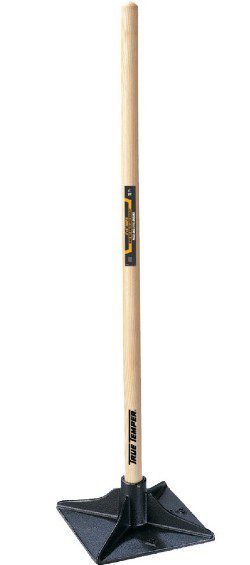The Big Box has front-loaded our spring inventory. It’s all here, but spring itself isn’t, weather-wise, not quite yet. So our store is swollen-to-bursting with everything we need for our busiest time of year, with overflowing shelves and ambitiously tall pallets of overstock stacked in every crevice from here to the roof. We’re just waiting for the first warm, sunny Saturday. [Checks 10-day forecast. Sighs.]
That’s not so bad when it comes to the grass seed and glyphosate and all the other stuff in boxes, which tend to be stackable and pallet-ize-able and relatively easy to deal with. It’s more of a challenge for things like long-handled garden tools — all that stuff Arlo referred to as “rakes and shovels and implements of destruction.”

My least favorite of those to deal with are the tampers. They’re awkwardly shaped and weighted in a way that defies convenient or safe storage. And they show up piled loose on trucks in a way that has me convinced the folks who loaded those trucks are trying to kill my crew. (Rule No. 1 for the unload crew: The Truck Is Trying to Kill You. Don’t Let It.)
If you’ve never used a tamper, it’s basically a long handle with a flat, heavy steel square attached to one end. Tampers are for tamping — for flattening and leveling and compressing piles of dirt or sand or gravel.
You might need one if you’re on the grounds crew for a baseball stadium or, maybe, if you’re a rec-league or church-softball coach who plays at a lot of dubious fields. Other than that, it’s a very project-specific tool. A tamper is not like a rake or a shovel — something you’ll need to own if you’ve got a yard or a garden to take care of. You only need it if you’re doing a specific sort of project like installing a new patio or pavestone pathway.
But — and this is my point here — it’s not a tool you’re going to need to use again after you’ve finished that project. At that point you’re just going to need to store it somewhere, more or less forever, someplace that’s out-of-the-way enough that you don’t end up tripping over it every time you need to grab your rake or your shovel or some other yard tool that you’ll actually need and use.
So, basically, apart from professional landscapers, there are only two types of customers who buy tampers: 1) Homeowners who need one for a few days while they’re doing a patio project, and 2) Homeowners who need one for a few days a few years later while they’re repairing that patio project, but who can’t remember where they put the thing after finishing that initial project a few years ago.
Put another way, I’m stuck with the dilemma of trying to figure out some way to store all of these tampers until we get a whole bunch of customers to buy them, each thereby bringing home their own, personal dilemma of trying to figure out some way to store their own, personal tamper.
A tamper, in other words, is absolutely the kind of tool you’re far better off borrowing than buying. That’s better for you and it’s less wasteful of money and resources. Heck, it’s even better for the friend or neighbor you’re borrowing the thing from because now they’ll get to enjoy the thought that “At least somebody is using the thing for something other than just taking up space in the back of the shed.”
It’s also better for democracy and for America as a whole. Democracy, after all, is contingent on basic reserves of mutuality, trust, and neighborliness — on what some scholars refer to as “social capital.”* The title of this post is a play on Robert D. Putnam’s much-discussed 1995 essay and later book “Bowling Alone,” which pondered the decline of bowling leagues as an example of “America’s declining social capital.” (Putnam published a revised and updated edition of his book in 2020 with the now-less-depressing subtitle “The Collapse and Revival of American Community.”)
The Putnam reference there isn’t a joke. The very same “declining social capital” he sees in lonely bowlers is also reflected in lonely tampers — the people who purchase, own, and store every tool they ever need, even if they only need it for one thing, rather than engaging in the neighborly economy of lending and borrowing.
Capitalism cheerfully strip-mines social capital for profit, and so over at the Big Box I’m happy to sell you not just a tamper of your very own but then, soon after, I’ll also happily sell you a new, larger shed to help store all of the tools I’ve helped you to acquire rather than to borrow or lend as needed. (And you know what you’re gonna need for that shed? A big, flat, level space. Big enough and level enough, probably, that you may need to buy a second tamper.)
The last time I wrote about social capital and sharing yard tools — see “Lawnmowers and $40 nachos” — was just before I started working at the Big Box. Since then I’ve sold a lot of lawnmowers, especially this time of year.
But I’ve also not sold a lot of lawnmowers, especially this time of year, because March and April are when a lot of folks fill their mowers from the gas cans that have been sitting in their garage since last summer and then think they need a new lawnmower because their old one won’t start. We send them home with a $10 can of Sea Foam instead of a $400 lawnmower.
I like to think that, in the long run, that’s good business — that saving our customers some money and helping them take better care of their stuff makes them trust us enough to keep coming back.
That’s also why I don’t start by pushing our truck rental service but instead suggest that customers first call “your friend with a pickup truck.” It’s a disheartening validation of Putnam’s thesis that so many of our customers turn out not to have a friend with a pickup truck. “Are you sure?” I ask, reciting the TV-spot boilerplate about how the F-150 has been America’s best-selling vehicle for the past 41 years. But somehow they don’t know — or don’t know they know — anyone with a pickup truck they could borrow. These folks all have sofas and boxsprings and bookshelves back at home, but I have no idea how they got them there. I guess they rent a lot of trucks and truck-drivers and moving guys. A lack of social capital can be expensive.
I try not to use phrases like “America’s declining social capital” when talking to customers who are buying things like tampers, but I do ask whether they might just want to borrow one from a neighbor or from their brother-in-law or somebody. That’s usually a better solution for them, for their budget, for neighborliness and social capital, for America, and for democracy in general.
Unfortunately, it does nothing to help with my where-the-heck-am-I-supposed-to-store-all-this-tamper-overstock? dilemma. But that’s my problem, not theirs.
* “Social capital” is an awkward phrase for what I’d rather just call neighborliness. It’s a weirdly defensive term — “social capital” — that seems designed to appeal to people who’d refuse to acknowledge its existence or importance if it weren’t described in terms that make it sound like something that can be easily quantified and, therefore, exchanged. Alas, that defensiveness might be prudent because, after all, this is MAGAmerica — a place where the basic neighborliness of lending and borrowing lawn tools may be denounced as suspiciously socialist.
P.S. I vaguely remember writing a Prism item at some point back in the ’90s about some church that ran a kind of “lending library” for lawn tools and hand tools and power drills and such. It was basically a shed full of tools, a clipboard with a sign-out-sheet, and the honor system. Cool idea and one that could be replicated elsewhere.













